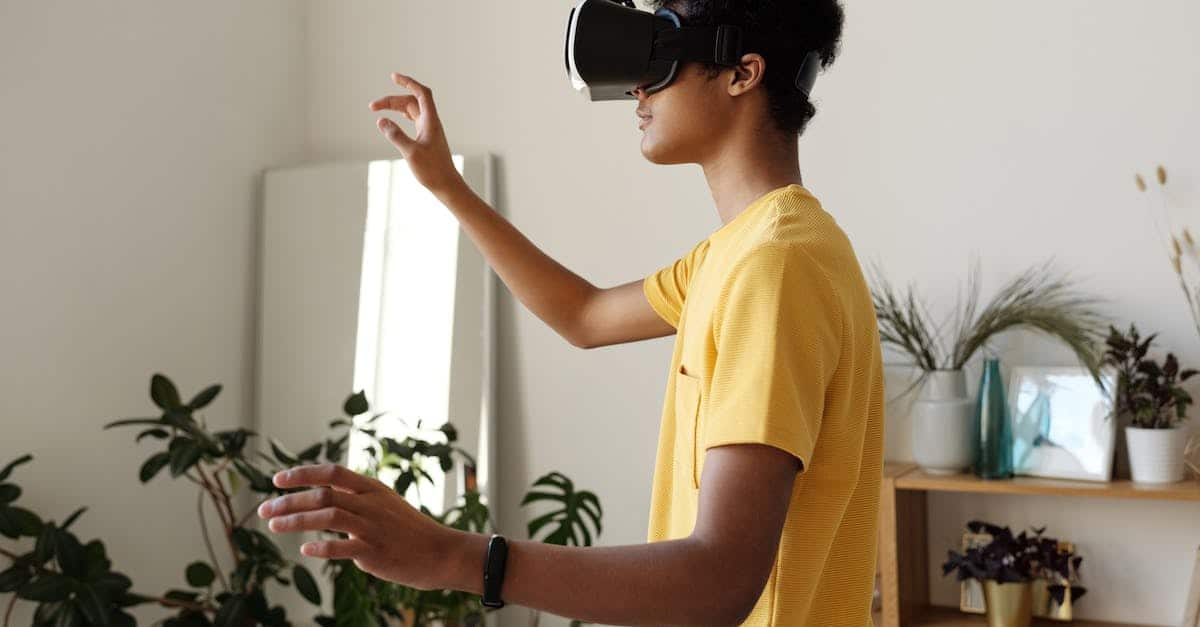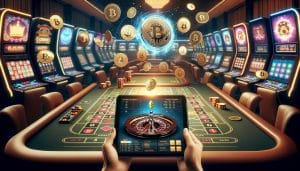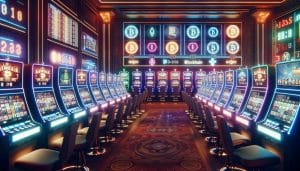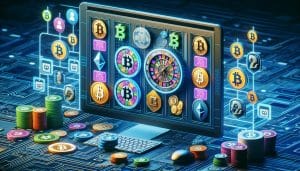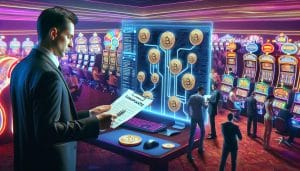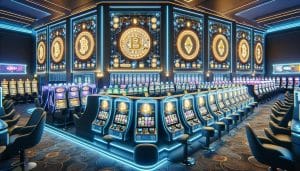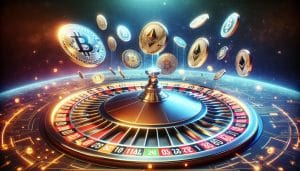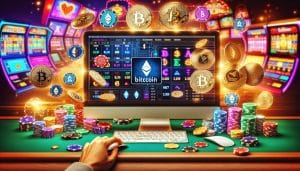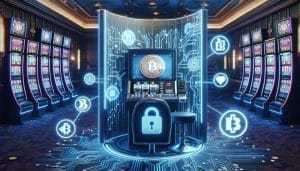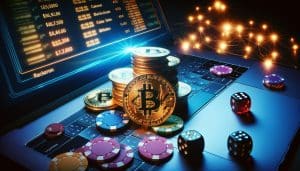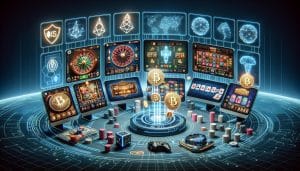Imagine a gaming world where you’re not just a player but a stakeholder, where every item you earn or character you develop can become a true digital asset. That’s the promise of decentralized gaming platforms using blockchain technology. These platforms are transforming the gaming industry by offering unparalleled security and player empowerment.
You’ve likely heard of blockchain in the context of cryptocurrencies, but it’s also revolutionizing the way we play and create games. In this article, you’ll explore how decentralized gaming platforms work, the benefits they offer, and the challenges they face. Whether you’re a gamer, developer, or simply curious about the future of gaming, you’re in for an enlightening journey through the landscape of blockchain-based gaming.
How Decentralized Gaming Platforms Work
Decentralized gaming platforms leverage the power of blockchain to change how you interact with games. You’re no longer just a player in a centralized system where game publishers have the ultimate control. Instead, as part of a decentralized gaming ecosystem, you hold a piece of the pie. This means that your in-game assets, achievements, and even gaming experiences can become truly yours, secured by blockchain technology.
At its core, a decentralized gaming platform operates on the principle of a distributed ledger. This ledger records every transaction and in-game event across a network of numerous computers—nodes. Each node has a copy of the ledger, making it nearly impossible to alter or hack the data. You benefit from this as it offers an unprecedented level of security for your in-game items and currencies.
When you perform actions like trading items or earning rewards, these are recorded as transactions on the blockchain. They’re permanent and verifiable, providing clear proof of ownership. Smart contracts, self-executing contracts with the terms of the agreement directly written into code, facilitate these transactions automatically.
- Indelible Ownership Records: Transactions are timestamped and immutably recorded.
- Smart Contracts: They execute automatically based on predefined rules.
- Tokenization of Assets: In-game items can be represented as tokens that you can trade, sell, or keep securely.
| Benefits | Description |
|---|---|
| Security | Blockchain’s distributed nature safeguards assets. |
| Transparency | Every transaction is openly recorded. |
| Interoperability | Assets can be used across different games on the same blockchain. |
By participating in decentralized gaming platforms, you’re stepping into a realm where your actions and investments retain their value outside the game’s universe. The potential for cross-game compatibility further promises to bring an unprecedented level of freedom and innovation to your gaming experience.
The integration of blockchain into the gaming world is not without its challenges, though. Performance issues like slower transaction times compared to centralized servers, the learning curve associated with new technologies, and the need for widespread adoption are potential hurdles. However, these are being addressed as the technology matures and becomes more integrated into the gaming industry.
Benefits of Decentralized Gaming Platforms
When you’re exploring the realm of decentralized gaming, you’ll quickly encounter a host of benefits that set these platforms apart from traditional gaming ecosystems.
Ownership lies at the core of decentralized gaming. Unlike traditional games where your hard-earned in-game items and achievements are bound to a single platform, ownership on the blockchain is absolute. Players have verifiable ownership of their in-game assets, which can be traded, sold, or utilized in other compatible gaming worlds. This ownership is recorded on the blockchain, ensuring that there’s no dispute over who possesses what, which adds an unprecedented layer of security to your gaming investments.
Interoperability is another groundbreaking feature. Imagine wielding a legendary sword in one game and then porting it over to another game within the same ecosystem. This cross-game compatibility enriches your gaming experience, allowing assets to retain value and utility across various platforms.
A decentralized gaming platform enhances transparency. Every transaction, from buying a new character to acquiring unique items, is recorded. You see every transaction that occurs on the network, ensuring that every player’s move is fair and traceable. Your trust in the game’s economy is bolstered by this level of openness.
Financial Opportunities in Gaming
The fusion of gaming with blockchain opens up new financial opportunities for gamers. Through features like play-to-earn models, gamers can actually earn cryptocurrency for their gameplay, trading, and participation in game ecosystems. These incentives are changing the way you think about gaming; it’s not just a hobby but potentially a source of income.
The Challenge of Adoption
While decentralized gaming platforms offer various benefits, they also face adoption challenges. The number of users on these platforms is still growing, and it requires mainstream gamer and developer buy-in to reach its full potential. The next phase of growth hinges on user experience improvements, increasing transaction speeds, and easing the learning curve for new adopters.
Blockchain gaming is poised to redefine interactive entertainment. You’re not just a player but a stakeholder in the game’s universe, with the potential to influence its economy and direction. As this technology matures, your adventures in these decentralized worlds will likely become richer and more rewarding.
Challenges Faced by Decentralized Gaming Platforms
While decentralized gaming platforms offer several advantages, they encounter significant challenges that impede widespread adoption. First and foremost, scalability is a concern. Blockchain networks, particularly those utilizing Proof of Work (PoW) consensus mechanisms, often struggle with transaction throughput, leading to slower in-game actions and a diminished experience for gamers accustomed to the speed of traditional gaming systems.
Usability poses another daunting task. The typical gamer might find the process of creating a digital wallet, buying cryptocurrency, and interacting with smart contracts overwhelming. The complexity of these steps can deter potential users who are not familiar with blockchain technology. Simplifying these processes is critical for decentralized platforms to match the user-friendly nature of their centralized counterparts.
Moreover, regulatory compliance is a significant hurdle due to the evolving nature of blockchain legislation. Games enabling play-to-earn models could fall under financial regulatory oversight, complicating their operation as they navigate the legal frameworks of various jurisdictions.
Technical limitations also present notable difficulties. Smart contracts, which are the backbone of these platforms, are immutable once deployed. Any bugs or issues within them can be exploited, potentially leading to loss of funds or assets, undermining player trust in the system.
The table below showcases some key challenges and their potential impact on blockchain-based gaming:
| Challenge | Potential Impact |
|---|---|
| Scalability | Inadequate transaction speed and network congestion |
| Usability | Higher barrier to entry for non-technical users |
| Regulatory Compliance | Uncertainty and potential legal complications |
| Technical Limitations | Vulnerability to bugs and exploits |
Interoperability is yet another challenge that decentralized gaming platforms face. Although progress has been made, many blockchain platforms still operate in silos, which hinders asset transfer and player interaction across different games and ecosystems. Overcoming these barriers is essential for creating a seamless, integrated gaming universe where assets and identities are universal.
The Future of Gaming: Blockchain-Based Gaming
Imagine a gaming ecosystem that’s not just an entertainment platform but also an investment avenue and a social network. This is what’s on the horizon with blockchain-based gaming. The integration of blockchain technology is poised to revolutionize how you interact, transact, and establish your presence in virtual worlds.
Within these decentralized realms, gaming economies are getting a facelift. Traditional in-game purchases can sometimes feel like throwing money into a void, but blockchain gaming turns this paradigm on its head. In a blockchain game, your in-game purchases could become actual investments. As the rarity and demand for certain items increase, so does their value, potentially offering real-world returns.
Beyond mere ownership, blockchain lets you carry your digital assets from one game to another, a feature known as interoperability. This doesn’t just cement your ownership; it allows for a level of continuity previously unimaginable. Imagine taking a sword you’ve won in one game into another game as your starting weapon.
This level of integration also enables a robust secondary market. Here, gamers can safely and efficiently buy, sell, or trade assets without the need for a centralized intermediary. This market isn’t just limited to in-game items but extends to skins, characters, and even gaming experiences.
Security and Trust in Blockchain Gaming
Blockchain goes a long way in addressing trust issues in online transactions. The immutable nature of blockchain records all transactions transparently, leaving little room for disputes. By decentralizing the control, these platforms reduce the risk of fraud and provide an environment where you can game without fear of behind-the-scenes manipulation.
Participation and Governance
Another groundbreaking feature of blockchain gaming is the introduction of governance tokens. These tokens give you a voice in the platform’s development and decision-making processes. Your investment in the game translates to a stake in its future, making you a part of the ecosystem’s growth and direction.
While the current landscape is promising, the evolution of blockchain gaming hinges on addressing the existing limitations. As these platforms mature, developers and gamers alike are likely to find creative ways to bridge the gaps between the blockchain world and mainstream gaming. With continuous improvements, the day isn’t far when blockchain-based gaming could become the new gold standard for the industry.
Conclusion
You’re standing at the precipice of a gaming revolution where your mastery of virtual worlds can translate into tangible rewards. The era of blockchain gaming isn’t just coming; it’s here, reshaping your in-game experiences and the value of your digital conquests. As you wield governance tokens like a scepter, you’re not just playing—you’re participating in the shaping of new realms. Remember, the power of blockchain isn’t just in the technology itself but in how you leverage it to forge an unprecedented gaming journey. Embrace the change, for your adventures are no longer confined to the digital ether—they’re investments in a future where gaming and reality converge.
Frequently Asked Questions
What are the benefits of decentralized gaming platforms?
Decentralized gaming platforms offer numerous benefits including true ownership of in-game assets, increased interoperability between games, and enhanced transparency regarding game mechanics and financial transactions.
How can blockchain technology revolutionize gaming?
Blockchain technology can revolutionize gaming by enabling players to earn cryptocurrency through gameplay, turning in-game purchases into potential investments, and allowing for cross-game use of digital assets.
What financial opportunities does blockchain gaming provide?
Blockchain gaming provides financial opportunities through the potential earning of cryptocurrency and by increasing the value of in-game assets which can be traded like real-world commodities.
How does blockchain technology increase transparency in gaming?
Blockchain’s immutable ledger ensures transparent record-keeping, hence all transactions and changes in ownership of in-game assets are open and verifiable, leading to a more trustworthy gaming environment.
What is interoperability in blockchain gaming?
Interoperability in blockchain gaming is the ability for players to transfer and utilize their in-game assets across different games within the same blockchain network, increasing the utility and continuity of the virtual goods.
Can in-game purchases become actual investments?
Yes, in-game purchases can become actual investments in blockchain gaming because items can increase in rarity and demand, thus potentially growing in value over time.
How does blockchain gaming provide players with a voice in development?
Blockchain gaming often introduces governance tokens, which grant players voting rights on various aspects of the platform’s development, providing them with a direct say in the evolution of the game.
What challenges does blockchain gaming face?
Blockchain gaming faces challenges such as scalability issues, a need for improved user-friendliness, and bridging the gap between traditional gamers and the emerging blockchain gaming community.
